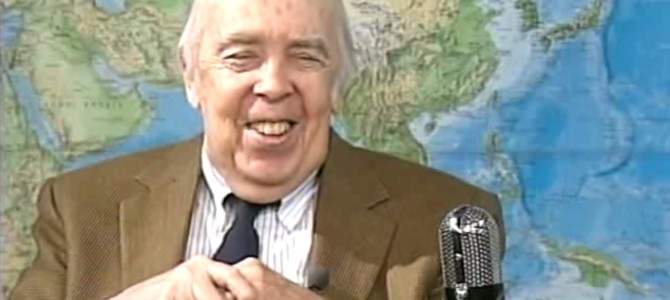A giant of American conservatism and one of its movement’s seminal figures, M. Stanton Evans, passed away Tuesday at the age of 80.
The highlights of his career are covered nicely in this surprisingly respectful New York Times obituary—youngest editor of a major national newspaper, chairman of the American Conservative Union, radio and television commentator, Cold Warrior.
But there was a lot more to Stan than that. He was an author, for one thing, of books and ideals. Much has been made (as it should) of the fact he held the pen at the 1960 gathering at the Buckley compound that produced the Sharon Statement, the conservative movement’s early declaration of principles. Of modern conservatism’s Founding Fathers, then, Stan Evans was its Thomas Jefferson.
Stan Evans Was Warm and Witty
Unlike Jefferson, who could be conniving and petty, Evans was among the warmest, most engaging, and most encouraging people that one could meet.
He was also one of the funniest and cleverest. It was impossible to be around the man without laughing. For all the seriousness he brought to fleshing out the principles and ideas that animated the modern conservative movement, he understood as few do that life is a great comedy, with each new day providing ample evidence of that fact. (A number of his classic lines are recounted in some wonderful tributes from Steve Hayward, Lee Edwards, and in the Washington Times’ obituary.)
But it wasn’t just wit with Stan. He possessed a priceless comic sensibility. He could deliver the most preposterous line with an almost bone-chilling seriousness of voice and expression. He particularly delighted in getting a rise from the humorless, self-serious Left—the kind of people would be outraged when he’d say things like, “I never really cared much for Nixon until Watergate.”
Skewered Good Naturedly By Stan Evans
I had the good fortune to know Stan from an early age – my father had been with him at Sharon—and I spent time with him throughout the years. When I heard that he had died, a couple choice Evans lines from my own experience came to mind.
One had to do with his great work, “The Theme Is Freedom.” The book is Stan’s opus, a classic in the canon of modern conservative thought that will still be read 50 years from now.
Stan had a lot of trouble writing the book, taking many years longer than planned. It was not uncommon for close friends—many doubting the book would ever actually be finished—to needle him about its exceedingly slow pace. Pressed on one occasion how the book was coming along, he shot back, “Oh, just great. Just this week I finished two more chapters—one on Canadian postal reform and other titled ‘Our Mineral Heritage.’”
When the Left was making a big deal about date rape, with congressional hearings and breathless news reports about this latest societal scourge, Stan put the whole manufactured “epidemic” in perspective. “Date rape, that’s the younger man’s game. Me, I’m really getting into stalking.”
Reacting to the mawkish over-sentimentality of baseball expressed by the likes of George Will and Doris Kearns Goodwin, Stan said they had it all wrong. “Baseball isn’t a metaphor for life. It’s a metaphor for softball.”
And then there was his immediate reaction to the devastating news that he had terminal cancer: “The good news is I no longer have to worry about my money holding out.”
An Enduring Legacy
For all his humor, he was a very serious man and a great public intellectual. He left a legacy not just at Sharon and in his writings, but through the National Journalism Center, which he founded in 1977. NJC taught scores of aspiring journalists to concentrate on the essence of fact-based reporting and to eschew ideological bias of any sort.
I was one. And while I no longer make my living as an ink-stained wretch, I learned a lot from Stan and the National Journalism Center that continues to serve me well. They didn’t just teach journalism; they taught one how to think critically about politics and economics.
What could not be taught, but could always be felt in his life and influence, was that a sense of heart and humor in the realm of ideas gives a conservative endurance and perspective—and provides his friends and allies with a lift to continue the fight for freedom, no matter what the odds.









